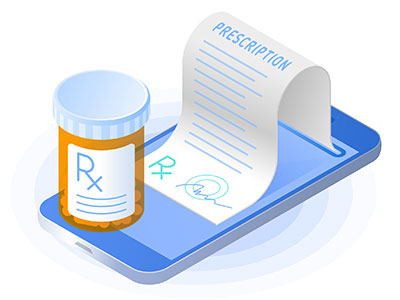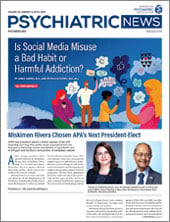The number of adults receiving their first prescription for a stimulant medication per month rose during the COVID-19 pandemic, a
study in
Psychiatric Services has found. A similar rise was not seen with first stimulant prescriptions in children.
The study also found that telemedicine was used for a sizable portion of these stimulant initiations, was more commonly used by psychiatrists, and was associated with greater odds of receiving follow-up care.
Alisa B. Busch, M.D., M.S., an associate professor of psychiatry at McLean Hospital in Belmont, Mass. and an associate professor of health care policy at Harvard Medical School, and colleagues analyzed data on commercially insured individuals recorded in the Optum Labs Data Warehouse from January 2019 through April 2022. The study used data from 535,629 children aged 2 to 17 years and 2,116,160 adults aged 18 to 64 years.
After the researchers adjusted for pre-pandemic trends in stimulant initiation and for patient characteristics, they found that the average monthly number of stimulant initiations per 100,000 children was similar before and during the COVID-19 pandemic, 57 compared with 56 initiations, respectively. However, stimulant initiations per 100,000 adults rose from 27 before the pandemic to 33 during the pandemic.
Busch and colleagues noted that
recent data from the Centers for Disease Control and Prevention also identified an increase in stimulant prescription fills during the pandemic among adults; these new data now show the increase was not just limited to adults who had previously taken these medications.
Many of these adults who initiated stimulants during the pandemic did so via telemedicine. The telemedicine prescription rate peaked early—52.7% of adults received their initial stimulants via telemedicine in April 2020—then dropped to 27.9% by April 2022. This rate was still twice as high as that for children, which dropped from an peak of 56.8% in April 2020 down to 13.9% by April 2022.
Psychiatrists were much more likely than other prescribers (such as primary care physicians or other specialists) to initiate stimulants via telemedicine for both adults and children, which Busch said was not surprising. “We know that, in general, psychiatrists and other mental health specialists continue to use telemedicine much more than other health care providers,” she told Psychiatric News.
Busch reflected on the current debate in health policy about initiating and prescribing controlled substances, including stimulants, via telemedicine.
“Some are concerned that it may, in some circumstances, contribute to overprescribing or diversion,” she said. “[However], in a lot of prior research, patients reported improved satisfaction with telemedicine compared with in-person care because telemedicine provides increased convenience, better geographical access to [health professionals] when there is a shortage in the community, and opportunities for privacy in seeking psychiatric care.”
In this analysis, Busch and colleagues found that between January 2019 and April 2022, on average only 21.8% of stimulant initiations for adults were followed up with a visit with the prescribing health professional within 30 days. However, patients were about 60% more likely to have a follow-up visit if they received stimulant initiation via telemedicine.
“We are limited in how much we can differentiate quality of care in claims data, so while it is noteworthy that we observed improved quality in terms of follow-up care when stimulants were initiated via telemedicine, there are other aspects of quality that we are not able to observe in these data,” she said. “These would be things like whether the initiations were clinically appropriate and whether there was adequate monitoring for clinical outcomes and side effects.”
Busch said policy decisions on telemedicine prescribing will have important implications for patients and their family members or caregivers in terms of accessing care.
“There is a risk that if the regulations do not strike the right balance between access and reducing diversion, patients who need care will have more difficulty in obtaining it,” Busch said. “Rather than prohibiting stimulant initiation via telemedicine, it would be better for policymakers to identify providers or companies that are inappropriately prescribing stimulants or other controlled substances, and also to develop policies that make inappropriate prescribing absent an adequate clinical evaluation more difficult.”
This study was supported by the National Institute of Mental Health and the National Institute on Drug Abuse. ■


